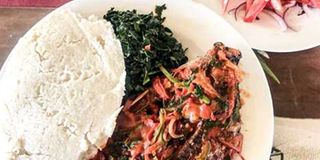How Ukraine war made your ugali, breakfast costly

A meal of ugali, sukumawiki and fish. When the cost of fuel and cooking gas shot up and the prices of ugali, bread and chapati became unpalatable, the story of the Russia-Ukraine war happening two seas away from Kenya was now telling itself in literally every meal.
This was a war involving two countries that were supplying Kenya with 44 per cent of all the wheat its citizens were consuming. Its effects were bound to be felt in the country, one way or another.
As Russia stormed Ukraine on February 24, 2022, some Kenyans barely took notice. It was understandable because Senkivka, the border town that Russian troops used as they marched into Ukraine amid spirited aerial warfare, is at least 5,9000 kilometres from Nairobi.
But when the cost of fuel and cooking gas shot up and the prices of ugali, bread and chapati became unpalatable, the story of the war happening two seas away from Kenya was now telling itself in literally every meal.
You may call it poetic that one local bread maker announced a rise in prices with effect from May 1, 2022, the same day President Uhuru Kenyatta asked the crowd during his Labour Day speech: “Yaani mimi Uhuru niko Ukraine? Ninafanya nini huko? (Am I, Uhuru, in Ukraine? What am I doing there?”
That was the retired president’s response to criticism of the rising cost of basic commodities. The price rise saw a 1500-gramme loaf shoot up by Sh15. The common 400-gramme loaf increased by Sh5. A year since the Ukraine assault began, Kenyan meal times still have ingredients whose costs are attributable to the war. The Kenya Institute for Public Policy Research and Analysis says 14.5 per cent of all the food consumed in Kenya last year was imported.
“Food imports put Kenya in a vulnerable position regarding economic shocks in the global market,” the institute said in an August 2022 report. “In Kenya, 67 per cent of wheat is from Russia, 22 per cent from Ukraine and 11 per cent from the rest of the world. Russia is the world’s largest exporter of fertiliser and exports a significant volume to the East African region. Disruption in fertiliser production and exportation has caused a spike in the price of fertiliser in Kenya.
“The sanctions imposed on Russia led to an increase in wheat importation costs, with the landing cost in Kenya increasing to $500 per tonne from $400. The Russia-Ukraine war has led to a surge in fuel prices in Kenya, leading to high production and transportation costs and thus affecting the distribution of food commodities.”
And according to the African Development Bank, 31 per cent of maize imported by African countries is from Ukraine. A UN database says that in 2020, maize imports from Ukraine to Kenya were worth $1.95 million (Sh246.8 million). With the war, the effects were palpable.
Collective menu
Dr Hillary Nyang’anga of the Department of Agricultural Economics at the University of Nairobi told the Saturday Nation the war has been felt in two major ways on Kenyans’ collective menu. One is due to Kenya’s dependence on Russia for fertiliser and petroleum products. Sanctions against Russia caused a shortage in Kenya and across the globe. The second is the destabilisation of Ukraine due to the unrest, which interrupted the supply of cooking oil and wheat.
“Inasmuch as the war is far away from us and we cannot get to listen to the bombs and the sirens and see the bloodshed, we are hugely affected economically. And this is cutting across the country and the entire continent,” said Dr Nyang’anga.
“We need to look at how to become self-sustainable. And this will take time, so that inasmuch as we’ll be having some of these global challenges, we can always spring back to life, given our internal mechanisms. We’ve got a lot of potential, Kenya being an agricultural country,” he added.
Solidarity
Meanwhile, various envoys in Kenya yesterday visited the Ukrainian ambassador to Kenya Pravednyk Andrii to register their solidarity in the face of the war. Embassies that had an anniversary engagement with the Ukrainian embassy include the US, the UK, Canada and the Netherlands.
The UK High Commission tweeted: “We stand united with Ukraine as we mark one year since Putin’s illegal invasion. Our Charge D’Affaires, Josephine Gauld, visited Ambassador Pravednyk to show our solidarity.”
The US embassy posted a photo of its ambassador to Kenya, Ms Meg Whitman, shaking hands with Mr Pravednyk with the caption: “The Ukrainian people are displaying incredible courage while standing up for shared democratic values. The United States continues to #StandwithUkraine.”
The Netherlands embassy posted: “Today we observe one year of war in Ukraine. We support the Ukrainian people, and we will do whatever it takes, for as long as it takes. #WeStandwithUkraine.”
The Russia-Ukraine war, which began after years of escalating tensions, saw Kenya take a strong position against Russia in its early stages, bashing Moscow for defying the territorial integrity of Ukraine.





